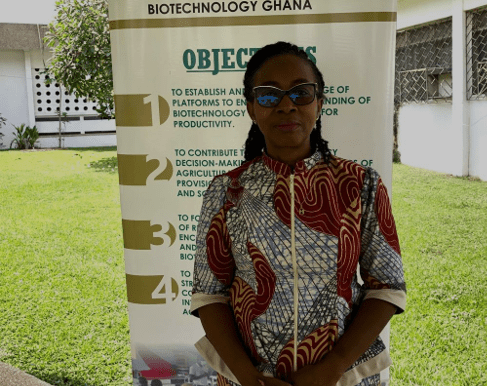
By Emmanuel AKOMEA
The Deputy Director-General and Chief Scientist at the Council for Scientific and Industrial Research (CSIR), Professor Marian Quain, has called for increased institutional awareness and public engagement to bolster the adoption of biotechnology innovations, particularly in the agricultural sector.
According to her, improving the visibility of their work, both within their institutions and in the surrounding communities, is critical to driving awareness and acceptance of these transformative technologies.
Central to this initiative is the need to highlight the innovative research underway at institutions like the Crop Research Institute, where pioneering technologies such as genetically modified (GM) crops are being developed.
“People walk into my tissue culture facility and they are amazed at what is going on. Meanwhile, they may be in the same building as me, but they do not know that in one room in the building, I am growing several plants. It is paramount that we are aware of what is happening in our backyard. Seeing believes and it helps us tell our story,” she said.
To achieve this, she called for initiatives like open house events, where scientists can directly engage with their peers, technicians and the public to display their innovations and address any concerns.
Speaking at a biotechnology workshop for the scientific community in Accra, Prof. Quain also noted that beyond the institutional walls, it is crucial to take these technologies directly to the communities they aim to serve, nurturing a deeper understanding and appreciation for the role of science and biotechnology in addressing pressing challenges like food security and climate change.
Her comments come at the back of the release of Songotra T Cowpea, a genetically modified crop designed to combat significant losses caused by a devastating insect pest.
Songotra T Cowpea
Dr. Daniel Osei Ofosu, Senior Research Scientist at the Biotechnology and Nuclear Agriculture Research Institute of the Ghana Atomic Energy Commission said Songotra T’s introduction would reshape the cowpea farming landscape, offering benefits that extend from the field to the consumer.
The new GM cowpea is resistant to the Maruca pod borer, an insect responsible for up to 80 percent of cowpea crop losses in severely affected farms. Traditionally, cowpea farmers have relied on extensive pesticide spraying, applying chemicals as often as eight times over the plant’s short eight-week growth period to prevent infestation.
Dr. Ofosu mentioned that despite these efforts, many still face severe crop loss, which has driven cowpea prices to unprecedented levels of over GH₵3,000 for a 50kg/bag.
Nigeria has already introduced a new variety of cowpeas that resists pests to boost their market share in the region, as buyers prefer high-quality produce. Ghana is now the second African country to make this pest-resistant cowpea variety available, indicating a significant step in local cowpea production.
The Songotra T cowpea, according to CSIR, is set to deliver substantial economic benefits to both farmers and consumers, with the potential to stabilie or even reduce the cost of beans in Ghana. CSIR and its partners hope that the successful introduction of Songotra T will encourage greater acceptance and adoption of biotechnology solutions within Ghana.
On Thursday, July 25, 2024, the Pod Borer Resistant Cowpea (PBR Cowpea), Songotra T – the first-ever biotech crop in the country – was released. According to Dr. Ofosu, farmers can start planting in the next planting season.
Safety of Songotra T
Principal Regulatory Officer at Food and Drugs Authority, Nana Akua Yeboah, during the workshop, assured the public that the Songotra T cowpea variety has passed a thorough biosafety review and risk assessment and has been approved by the National Biosafety Authority as safe for both food and animal feed.
Following biosafety approval, the variety underwent extensive field trials across key cowpea-growing regions in northern Ghana to ensure its suitability and performance in local farming conditions.









